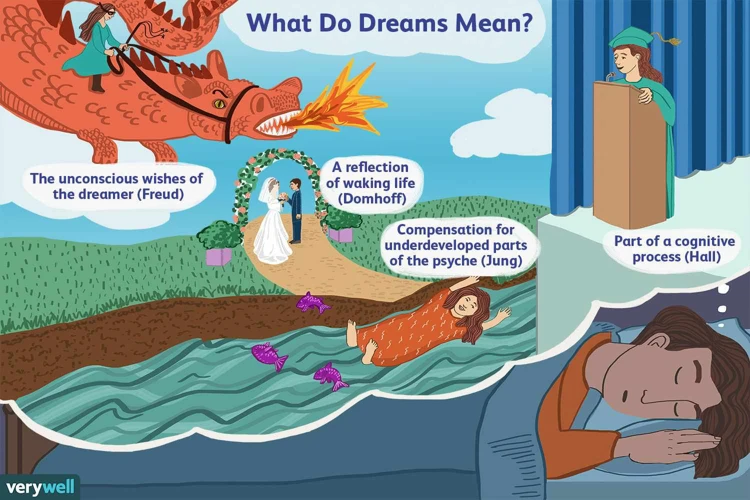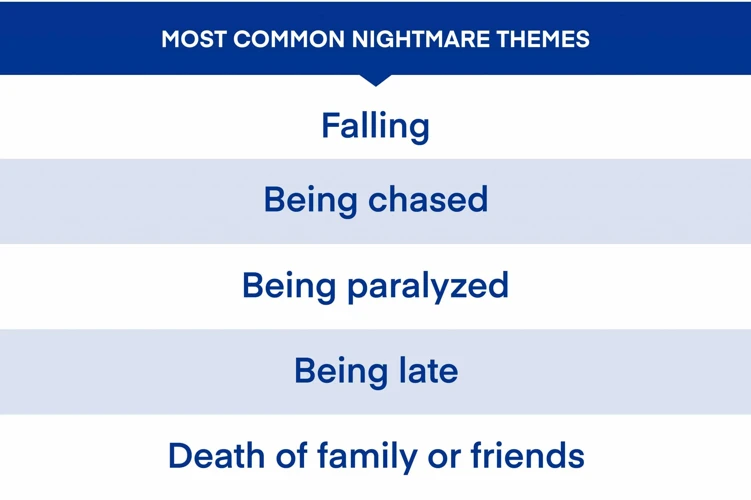Have you ever found yourself waking up in the middle of the night, drenched in sweat and feeling a sense of dread? These recurring nightmares can leave you feeling perplexed and unsure of their meaning. Unraveling the mystery behind these nightly experiences is not only fascinating, but it can also provide valuable insight into your subconscious mind. In this article, we will delve into the science behind dreams, explore the concept of recurring nightmares, analyze their symbolism, and discuss strategies to overcome them. So, grab a cup of tea, sit back, and get ready to embark on a journey of self-discovery as we delve into the enigmatic world of recurring nightmares.
The Science Behind Dreams

Dreams have long been a subject of fascination and intrigue. The elusive nature of these nocturnal experiences begs the question: what is the science behind dreams? Dreams serve a vital function in our overall well-being and mental health. They provide a gateway to our subconscious mind, allowing us to process emotions, memories, and unresolved conflicts. One crucial aspect of dreaming is REM sleep, or Rapid Eye Movement sleep. During this stage, our brains are highly active, resembling a state of wakefulness. It is believed that REM sleep plays a significant role in consolidating memories, enhancing creativity, and facilitating emotional regulation. While the precise mechanisms behind dreams remain an enigma, scientists continue to unravel their complexities, shedding light on the hidden realm of our subconsciousness. Understanding the science behind dreams can help us gain insight into the mysteries of our own minds and unlock the potential for personal growth and healing.
The Function of Dreams
Dreams serve a vital function in our overall well-being and mental health. They provide a gateway to our subconscious mind, allowing us to process emotions, memories, and unresolved conflicts. While there is still much to learn about the intricacies of dreams, researchers have proposed several theories regarding their function. One such theory is the Memory Consolidation Hypothesis, which suggests that dreams play a role in consolidating and organizing memories. During sleep, our brains selectively replay and reinforce the information we have learned throughout the day, aiding in memory retention. Dreams also allow for the exploration of emotional experiences in a safe environment, helping us regulate our emotions and potentially providing insight into unresolved issues. Another fascinating aspect of dream function is their potential connection to problem-solving and creativity. Dreams have been known to spark new ideas and solutions to complex problems, as they tap into our unconscious thoughts and make different connections. Additionally, dreams may serve as a form of rehearsal, allowing us to practice and prepare for future events or challenging situations. The function of dreams is multi-faceted and continues to captivate researchers and dream enthusiasts alike. By unraveling the mysteries of our dreams, we can gain a deeper understanding of ourselves and the human mind.
The Role of REM Sleep
The Role of REM Sleep in the dreaming process is a crucial aspect to understand when it comes to unraveling the mystery of recurring nightmares. REM sleep, or Rapid Eye Movement sleep, is a distinct stage of sleep characterized by rapid eye movements, increased brain activity, and vivid dreaming. During REM sleep, our bodies become temporarily paralyzed, preventing us from acting out our dreams and ensuring our safety while we engage in vivid and often bizarre dream scenarios. This stage typically occurs multiple times throughout the night, with each REM period becoming longer as the sleep cycle progresses. Research suggests that REM sleep plays a vital role in memory consolidation and emotional regulation. It is during this stage that the brain processes and integrates the information gathered throughout the day, storing important memories, and discarding irrelevant ones. Additionally, REM sleep is believed to facilitate emotional regulation by providing an opportunity for the brain to process and regulate emotions experienced during wakefulness. Understanding the role of REM sleep is essential in understanding how nightmares may occur and why they often have such a significant impact on our emotions and well-being. To explore more about the relationship between nightmares and conditions like PTSD, you can read our article on exploring nightmares in PTSD.
Understanding Recurring Nightmares

Recurring nightmares can be a source of great distress, leaving individuals perplexed and searching for answers. These nightmares are characterized by the repetition of unsettling dreams, often causing intense fear or anxiety. While nightmares are a common occurrence for many people, the frequency and persistence of recurring nightmares set them apart. Understanding the nature of recurring nightmares is essential in addressing their impact on our sleep and well-being. These nightmares can stem from various underlying causes, such as trauma, stress, anxiety disorders, or even certain medications or sleep disorders. Exploring the possible triggers and contributing factors can help shed light on why these recurring nightmares persist. By unraveling the complexities of recurring nightmares, we can take steps towards finding relief and restoring peaceful sleep. If you’d like to learn more about the impact of sleep deprivation on nightmares and dreams, check out /sleep-deprivation-impact-nightmares-dreams/.
The Definition of Recurring Nightmares
Recurring nightmares are a phenomenon that many individuals experience throughout their lives, often arousing feelings of fear, distress, and unease. These nightmares are characterized by their repetitive nature, regularly occurring within the same dream or following a similar theme. Unlike ordinary dreams that may be forgotten upon waking, recurring nightmares persist and can significantly impact an individual’s overall well-being. The frequency and intensity of these nightmares can vary from person to person, with some individuals experiencing them sporadically and others having them on a regular basis. It is essential to note that recurring nightmares are different from occasional nightmares, as they persist over an extended period and often disrupt sleep patterns and quality of life. Understanding the definition of recurring nightmares is the first step in unraveling their underlying causes and uncovering potential solutions to alleviate their impact. If left unaddressed, these recurring nightmares can have a detrimental effect on one’s mental health and overall sense of well-being. Seeking guidance and support can be beneficial in managing and overcoming the distress caused by recurring nightmares. The link between nightmares and sleep disorders is well-established, and various treatment options, including medication, exist to help individuals find relief and improve their quality of sleep. Exploring the role of medication in treating nightmares and sleep disorders can provide valuable insights into potential solutions for those struggling with recurring nightmares.
Possible Causes of Recurrence
Possible Causes of Recurrence:
– Psychological Trauma: Experiencing a traumatic event such as abuse, a natural disaster, or a car accident can leave a lasting impact on our psyche. Psychological trauma can manifest in the form of recurring nightmares, where the distressing event is replayed over and over again during sleep. These nightmares serve as a way for the mind to process and make sense of the trauma.
– Anxiety and Stress: Anxiety and high levels of stress can contribute to the recurrence of nightmares. When we are going through a period of intense worry or pressure, our dreams may become more vivid and unpleasant. The underlying anxiety and stressors in our waking life can seep into our dream world, causing recurring nightmares.
– Sleep Disorders: Certain sleep disorders such as sleep apnea, insomnia, and restless leg syndrome have been associated with an increased likelihood of experiencing recurring nightmares. These conditions disrupt the normal sleep cycle and can lead to more intense and frequent nightmares.
– Medications and Substances: Certain medications and substances have been known to trigger nightmares and increase their recurrence. Antidepressants, beta blockers, and drugs that affect the central nervous system can all have an impact on our dream patterns. Additionally, alcohol and recreational drugs can disrupt the sleep cycle and contribute to the occurrence of nightmares.
– Post-Traumatic Stress Disorder (PTSD): Individuals with PTSD may experience recurrent nightmares as one of the symptoms of their condition. /exploring-nightmares-ptsd/ These nightmares are often directly related to the traumatic event that caused the disorder and can be extremely distressing.
Understanding the possible causes of recurring nightmares can help us identify underlying factors and work towards finding strategies to address and alleviate these distressing dreams. It is important to consult with a healthcare professional or therapist for a proper evaluation and guidance if recurring nightmares significantly impact your quality of life. Additionally, managing stress, practicing relaxation techniques, and maintaining a healthy sleep routine can also play a crucial role in reducing the frequency and intensity of recurring nightmares.
Unveiling the Symbolism

Unveiling the symbolism hidden within recurring nightmares can provide valuable insights into our subconscious minds. Common themes and recurring elements in these nightmares may hold deeper meanings and messages for us to decipher. By analyzing these themes, we can begin to unravel the symbolism and gain a better understanding of the underlying psychological and emotional factors at play. Is there a recurring location, person, or object in your nightmares? Exploring the symbolism behind these elements can reveal repressed emotions, unresolved conflicts, or deep-seated fears. For example, a dream of being chased may symbolize a sense of anxiety or avoidance in our waking lives. Similarly, spiders or snakes may represent hidden fears or feelings of vulnerability. It’s important to note that the interpretation of symbolism is highly personal and may vary from individual to individual. Engaging in dream journaling or seeking guidance from a dream analyst can help unveil the hidden meanings and provide a path towards self-discovery and healing. So, grab a notepad, and let’s embark on a journey of unraveling the intriguing symbolism within our recurring nightmares.
Analyzing Common Themes
Analyzing common themes in recurring nightmares can provide valuable insights into the underlying emotions and experiences that influence these distressing dreams. By identifying recurring motifs and patterns, individuals can begin to unravel the symbolism embedded within their dreams. One common theme often found in nightmares is being chased or pursued. This may signify a feeling of being overwhelmed or pursued by a problem or fear in waking life. Another prevalent theme is falling, which can represent a loss of control or a fear of failure. Additionally, encountering monsters or supernatural beings can symbolize deep-seated fears or anxieties. To analyze common themes, it can be helpful to keep a dream journal or create a list of recurring symbols and themes. By reflecting on these elements and exploring their personal significance, individuals can gain a better understanding of the emotions and experiences that may be influencing their recurring nightmares. Remember, the interpretation of dreams is highly subjective, and it is essential to consider personal experiences and feelings when analyzing common themes.
Interpreting Symbolic Elements
When it comes to interpreting the symbolic elements in our dreams, there is no one-size-fits-all approach. Symbolism in dreams is highly personal and subjective, and its meaning can vary from individual to individual. However, there are some common archetypes and symbols that tend to appear across different cultures and belief systems. One way to interpret symbolic elements in dreams is by keeping a dream journal. This involves recording your dreams upon waking and reflecting on the emotions, images, and themes present in each dream. By analyzing recurring symbols or patterns, you may start to uncover their personal significance. It can be helpful to explore the cultural and historical context of certain symbols, as they may carry universal meanings. For example, water often symbolizes emotions and the subconscious mind, while a snake may represent transformation and healing. Some individuals may also find value in consulting dream dictionaries or seeking guidance from a professional dream therapist. /role-medication-treating-nightmares-sleep-disorders/ Ultimately, the interpretation of symbolic elements in dreams is a deeply personal journey that requires introspection, self-awareness, and a willingness to explore the depths of one’s psyche.
Unlocking the Subconscious Mind

Delving into the depths of the subconscious mind is like embarking on a captivating journey of self-discovery. Psychological perspectives provide valuable insights into the significance of dreams and their connection to the subconscious. Theories such as Freud’s psychoanalytic approach suggest that dreams are a window into our deepest desires, fears, and unresolved conflicts. Exploring dream analysis techniques allows us to decipher the hidden messages within our dreams. Tools such as journaling, guided meditation, and art therapy can help unravel the symbolic elements embedded in our subconscious. By unlocking the secrets of our dreams, we gain a better understanding of ourselves, our emotions, and the underlying patterns that shape our thoughts and behaviors. This introspective process of self-reflection empowers us to navigate the complexities of our own minds, leading to personal growth and transformation.
Psychological Perspectives
Psychological perspectives offer valuable insights into the interpretation and analysis of dreams, including recurring nightmares. Different schools of thought within psychology provide distinct approaches to understanding the underlying meanings behind these nocturnal experiences. Here are some noteworthy psychological perspectives on dreams:
1. Psychoanalysis: Developed by Sigmund Freud, psychoanalysis suggests that dreams are windows into the unconscious mind. Freud believed that dreams fulfill unconscious desires and represent hidden symbolic meanings. Analyzing recurring nightmares through a psychoanalytic lens involves exploring repressed emotions, unresolved conflicts, and hidden fears.
2. Jungian Psychology: Carl Jung proposed an alternative perspective, focusing on the collective unconscious and archetypes. Jungian psychology suggests that recurring nightmares may contain universal symbols and patterns that reflect aspects of the collective human experience. Analyzing these dreams involves identifying recurring symbols and exploring their collective meaning.
3. Cognitive Psychology: Cognitive psychology views dreams as a reflection of everyday cognitive processes. According to this perspective, recurring nightmares may arise from cognitive distortions or maladaptive thought patterns. Analyzing these dreams involves identifying cognitive patterns, examining automatic thoughts, and exploring underlying cognitive schemas that contribute to the nightmares.
4. Existential Psychology: Existential psychology emphasizes the exploration of existential themes such as freedom, meaning, and authenticity. From this perspective, recurring nightmares may represent existential concerns or conflicts related to one’s identity and purpose in life. Analyzing these dreams involves reflecting on the existential themes and exploring their significance in the individual’s life.
It is essential to understand that these psychological perspectives offer different frameworks for interpreting recurring nightmares. Each perspective provides unique insights and can be used in combination to gain a richer understanding of the symbolic and psychological meanings embedded within these dreams. Remember, dreams are highly personal experiences, and exploring them from various psychological perspectives can aid in self-reflection, personal growth, and gaining a deeper understanding of ourselves.
Exploring Dream Analysis Techniques
Exploring Dream Analysis Techniques:
1. Dream Journaling: Keeping a dream journal is a fundamental technique in dream analysis. Upon waking up, immediately record your dreams in detail, including any emotions, symbols, or events that stood out. This practice helps to enhance dream recall and allows you to reflect on recurring themes or patterns over time. By examining your dream journal periodically, you may start to notice connections and gain insight into the underlying meaning of your dreams.
2. Free Association: Another technique used in dream analysis is free association. Take a significant symbol or event from your dream and start associating various thoughts, emotions, or personal experiences that come to mind. This approach allows you to delve deeper into the subconscious and make connections between your dreams and your waking life. Through free association, you can unlock hidden meanings and gain a better understanding of the messages your dreams may be conveying.
3. Active Imagination: Active imagination involves actively engaging with elements of your dream through visualization or dialogue. This technique allows you to interact with dream characters or symbols in a conscious state, gaining insight into their significance or purpose. By entering the dream realm through active imagination, you can explore different perspectives, resolve inner conflicts, and tap into the wisdom of your subconscious mind.
4. Symbolic Interpretation: Dreams are often filled with symbols that may have personal or universal meanings. Exploring the symbolic significance of objects, people, or events in your dreams can provide valuable insights into your subconscious mind. Symbolic interpretation involves researching and reflecting on the possible meanings behind these symbols, considering both their cultural and personal associations. This technique helps to decode the messages your dreams may be conveying and uncover hidden truths about yourself.
By employing these dream analysis techniques, you can dive deep into the realm of your dreams and unravel their hidden meanings. Remember, dream analysis is a subjective process, and the interpretation of your dreams ultimately depends on your personal experiences, emotions, and intuition.
Strategies to Overcome Recurring Nightmares

When it comes to overcoming recurring nightmares, there are several strategies that can help bring relief and restore a sense of peace during sleep. Maintaining a consistent sleep routine is paramount in managing nightmares. This involves setting a regular bedtime and waking time, creating a calming evening routine, and ensuring a comfortable sleep environment. Additionally, engaging in relaxation and mindfulness techniques can help reduce anxiety and promote better sleep quality. Practices such as deep breathing, meditation, and progressive muscle relaxation can ease the mind and body into a state of relaxation before sleep. Another approach to consider is dream journaling, where you write down your dreams upon waking. This can assist in identifying patterns, triggers, and recurring themes in your nightmares. By understanding the underlying symbolism, you can address any unresolved issues or anxieties that may be contributing to the recurrence of these disturbing dreams. Remember, these strategies may take time and experimentation to find what works best for you, but with patience and perseverance, you can take control of your dreams and find restful nights once again.
Maintaining a Sleep Routine
Maintaining a consistent sleep routine is crucial when it comes to managing and preventing recurring nightmares. A regular sleep schedule helps regulate your body’s internal clock and promotes optimal sleep quality. Here are some tips to help you establish and maintain a healthy sleep routine:
1. Set a consistent bedtime and wake-up time: Go to bed and wake up at the same time every day, even on weekends. This helps regulate your body’s sleep-wake cycle and ensures you get enough restful sleep.
2. Create a calm sleep environment: Make your bedroom a comfortable and relaxing space. Keep the room cool, dark, and quiet. Consider using earplugs, eye masks, or white noise machines to block out any disturbances.
3. Avoid stimulating activities before bed: Engaging in activities that promote relaxation and winding down can help prepare your mind and body for sleep. Avoid screen time, such as watching TV or using electronic devices, at least an hour before bed. Instead, engage in activities like reading a book, taking a warm bath, or practicing relaxation techniques.
4. Limit caffeine and alcohol intake: Both caffeine and alcohol can disrupt your sleep patterns and increase the likelihood of experiencing nightmares. Avoid consuming these substances, especially close to bedtime.
5. Exercise regularly: Engaging in regular physical activity can contribute to better sleep. However, try to finish exercising at least a few hours before bedtime to allow your body to wind down.
By incorporating these strategies into your daily routine, you can establish a healthier sleep pattern and reduce the frequency of recurring nightmares. Remember, consistency is key when it comes to maintaining a sleep routine, so stick to your schedule as much as possible for optimal results.
Relaxation and Mindfulness Techniques
Relaxation and mindfulness techniques can be incredibly helpful in mitigating the impact of recurring nightmares and promoting restful sleep. By incorporating these techniques into your daily routine, you can cultivate a sense of calm and stability that may alleviate the intensity and frequency of your nightmares. Here are a few effective strategies to consider:
1. Deep Breathing: Practice deep breathing exercises to activate your body’s relaxation response. Take slow, deep breaths, focusing on filling your lungs fully with each inhalation and exhaling slowly. This simple technique can help reduce physical tension and anxiety, promoting a sense of tranquility before bedtime.
2. Progressive Muscle Relaxation: This technique involves tensing and relaxing different muscle groups in your body, one at a time. Start with your toes and work your way up to your head, consciously releasing tension from each muscle group as you go. By systematically relaxing your muscles, you can release bodily tension and promote a state of physical and mental relaxation.
3. Mindfulness Meditation: Engage in mindfulness meditation to cultivate present-moment awareness and detach from distressing thoughts or emotions. Find a quiet and comfortable space, focus on your breath, and observe any sensations, thoughts, or emotions that arise without judgment. Regular mindfulness practice can help reduce stress, anxiety, and the cognitive arousal associated with nightmares.
4. Visualization Techniques: Before sleep, envision a serene and peaceful scene, such as a tranquil beach or a lush forest. Imagine yourself in this setting, engaging all your senses and immersing yourself in the calming environment. Visualization can help shift your mind away from disturbing thoughts and create a positive mental state conducive to restful sleep.
5. Establishing a Bedtime Routine: Create a consistent bedtime routine that incorporates relaxation techniques. This can include reading a book, taking a warm bath, or engaging in gentle stretching exercises. By following a soothing routine leading up to bedtime, you signal to your body and mind that it’s time to unwind and prepare for sleep, reducing the likelihood of experiencing nightmares.
Remember, finding the relaxation and mindfulness techniques that work best for you may require some experimentation. Be patient with yourself as you explore different approaches and adapt them to your unique needs and preferences. Incorporating these practices into your daily life can promote better sleep hygiene and empower you to take control of your recurring nightmares.
Seeking Professional Help
When recurring nightmares become overwhelming and start to interfere with your daily life, it may be time to seek professional help. Consulting with a therapist who specializes in dream analysis or sleep disorders can provide valuable guidance and support. A therapist can help you explore the underlying causes of your nightmares and develop coping strategies to alleviate their impact. One effective approach is Cognitive-Behavioral Therapy (CBT), which aims to identify and challenge negative thought patterns and behaviors associated with nightmares. CBT techniques, such as image rehearsal therapy, can help you reshape your dreams and replace distressing elements with more positive and empowering imagery. Additionally, a therapist can provide a safe space to express your fears, anxieties, and traumas associated with recurring nightmares. Remember, seeking professional help is not a sign of weakness, but rather a courageous step towards regaining control of your sleep and overall well-being.
Consulting with a Therapist
Consulting with a therapist can be an invaluable step in addressing and overcoming recurring nightmares. Therapists trained in dream analysis and sleep disorders can provide a safe and supportive environment for you to explore the underlying causes of your nightmares. Through discussions and therapeutic techniques, therapists can help you delve deeper into the symbolism and meaning behind your dreams. They can also assist in identifying any potential underlying psychological or emotional issues that may be contributing to the recurrence of your nightmares. Working closely with a therapist can provide you with personalized strategies and coping mechanisms to mitigate the impact of these distressing dreams on your daily life. Additionally, therapists can utilize various therapeutic modalities, such as Cognitive-Behavioral Therapy (CBT), to help reframe negative thought patterns and beliefs associated with your nightmares. By addressing the root causes of your recurring nightmares with the guidance of a trained therapist, you can gain insight, relief, and empower yourself to take control of your sleep and mental well-being. Remember, seeking professional help is a brave and proactive step towards finding resolution and achieving restful, nightmare-free nights.
Exploring Cognitive-Behavioral Therapy
Exploring Cognitive-Behavioral Therapy (CBT) can be a powerful tool in overcoming recurring nightmares. CBT is a form of therapy that focuses on identifying and changing negative thought patterns and behaviors. When applied to nightmares, CBT aims to address the underlying causes and disrupt the recurring cycle. Here are some key elements of CBT that can be beneficial in tackling nightmares:
1. Thought Restructuring: CBT helps individuals identify and challenge the negative thoughts associated with their nightmares. By replacing irrational beliefs with more realistic and positive ones, the power and control of these distressing dreams can be diminished.
2. Exposure Therapy: This technique involves gradually exposing oneself to the aspects of the nightmare in a safe environment. By confronting the fears and anxieties associated with the dream, individuals can reduce the response triggered by the nightmare, eventually leading to its desensitization.
3. Relaxation Techniques: CBT also emphasizes the use of relaxation techniques, such as deep breathing exercises and progressive muscle relaxation, to manage anxiety and promote a sense of calmness before bedtime. These techniques can help create a more peaceful sleep environment, reducing the likelihood of recurring nightmares.
4. Sleep Hygiene: CBT explores the importance of maintaining a healthy sleep routine and optimizing sleep habits. This can involve establishing a regular sleep schedule, creating a relaxing bedtime routine, and making adjustments to the sleep environment to promote restful sleep.
5. Journaling: Keeping a dream journal is an effective CBT technique for recurring nightmares. By recording dreams and reflecting on their content, individuals can gain insights into recurring themes, patterns, and potential triggers. This information can then be used to develop coping strategies and work toward resolving the underlying issues.
By working with a trained therapist experienced in CBT, individuals can effectively explore and implement these techniques to address recurring nightmares. CBT offers a structured and evidence-based approach to understand and overcome the distressing nature of these dreams, empowering individuals to take control of their sleep and overall well-being.
Conclusion
In conclusion, recurring nightmares are an enigmatic phenomenon that can leave individuals feeling unsettled and perplexed. However, by exploring the science behind dreams, unraveling their symbolism, and delving into the depths of our subconscious minds, we can begin to understand and overcome these unsettling experiences. It is important to remember that dreams serve a crucial function in our overall well-being and mental health, providing a window into our deepest thoughts and emotions. By maintaining a sleep routine, practicing relaxation and mindfulness techniques, and seeking professional help when needed, individuals can take proactive steps towards overcoming recurring nightmares. Consulting with a therapist or exploring cognitive-behavioral therapy can provide valuable insights and techniques for managing and resolving these distressing dreams. With dedication and an open mind, it is possible to navigate the mysterious realm of recurring nightmares and find peace in the realm of our dreams. So, embrace the journey of self-discovery and unlock the secrets that lie within your subconscious mind.
Frequently Asked Questions
What is the purpose of dreaming?
Dreaming serves various purposes, including processing emotions, consolidating memories, and fostering creativity and problem-solving abilities.
Why do recurring nightmares happen?
Recurring nightmares can occur due to unresolved psychological issues, trauma, stress, anxiety, or sleep disorders.
Can recurring nightmares be a symptom of PTSD?
Yes, recurring nightmares can be a symptom of post-traumatic stress disorder (PTSD), especially if they are related to a traumatic event.
Is there a link between sleep deprivation and recurring nightmares?
Yes, sleep deprivation can increase the likelihood of experiencing recurring nightmares. Lack of quality sleep may disrupt the brain’s ability to process emotions effectively, leading to distressing dreams.
Are there any medications that can help with recurring nightmares?
Some medications, such as certain antidepressants and anti-anxiety medications, may help reduce the frequency and intensity of recurring nightmares in certain cases. However, medication should always be discussed with a healthcare professional.
How can I interpret the symbolism in my recurring nightmares?
Interpreting the symbolism in recurring nightmares can be done by analyzing common themes, identifying personal associations, and seeking guidance from dream analysis techniques or professionals specialized in dream interpretation.
Can recurring nightmares be overcome without professional help?
Yes, strategies such as maintaining a sleep routine, practicing relaxation techniques, and exploring self-help resources can significantly help overcome recurring nightmares. However, professional help can provide additional guidance and support.
Is Cognitive-Behavioral Therapy effective in treating recurring nightmares?
Yes, Cognitive-Behavioral Therapy (CBT) has shown to be effective in treating recurring nightmares. CBT techniques help individuals identify and challenge negative thought patterns associated with the nightmares, ultimately reducing their frequency and intensity.
How can a therapist help with recurring nightmares?
A therapist can provide a safe and supportive environment to explore the underlying causes of recurring nightmares. They can employ various therapeutic techniques, such as CBT, imagery rehearsal therapy, and trauma-focused therapy, to help individuals overcome their nightmares.
Can recurring nightmares be a sign of a deeper psychological issue?
Recurring nightmares can sometimes be a manifestation of deeper psychological issues, such as unresolved trauma, anxiety disorders, depression, or other mental health conditions. It is important to address these underlying issues for overall well-being.








